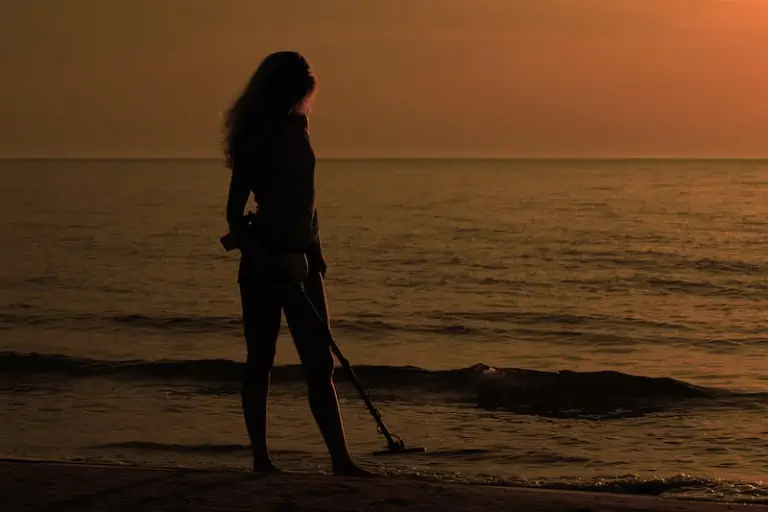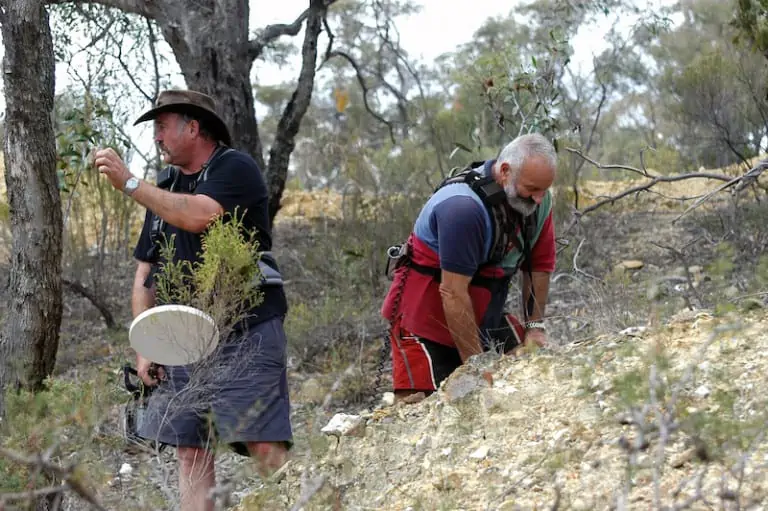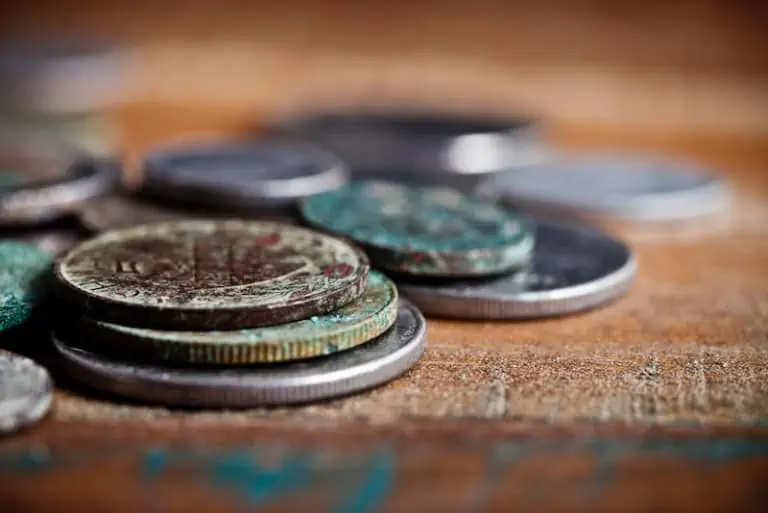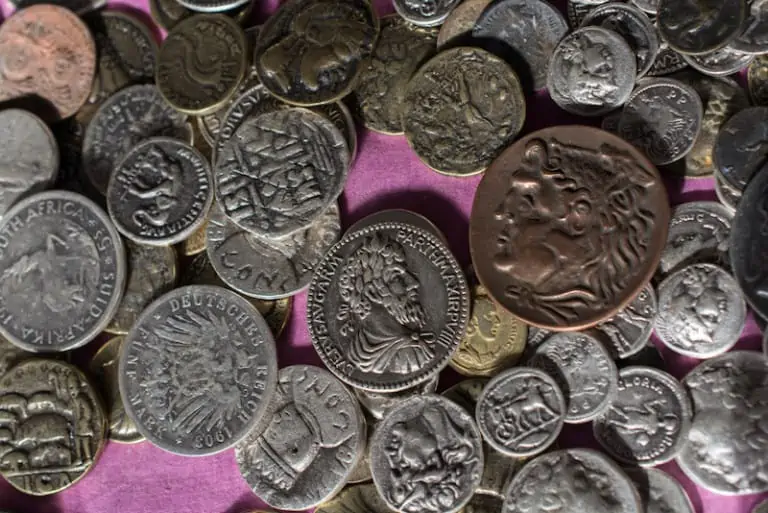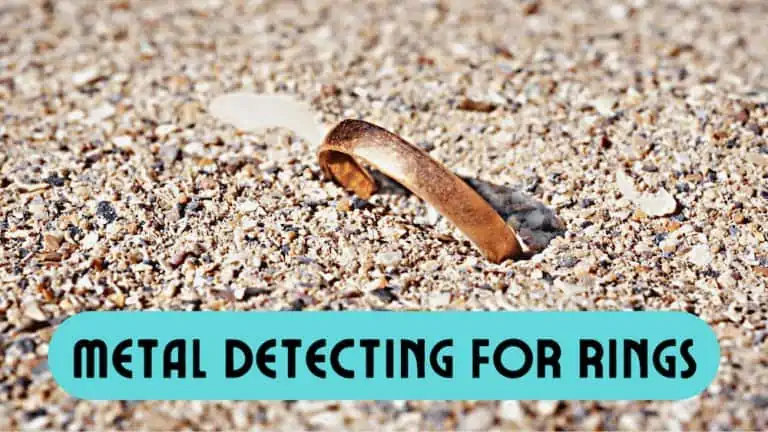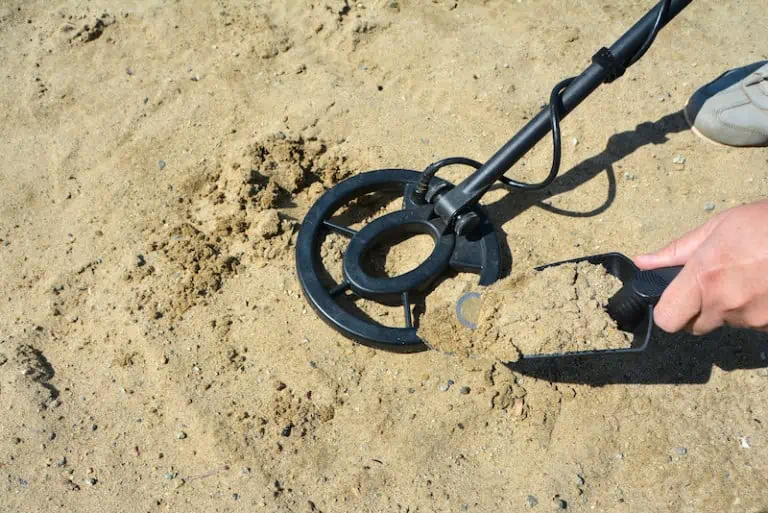50 Metal Detecting Tips for Rivers
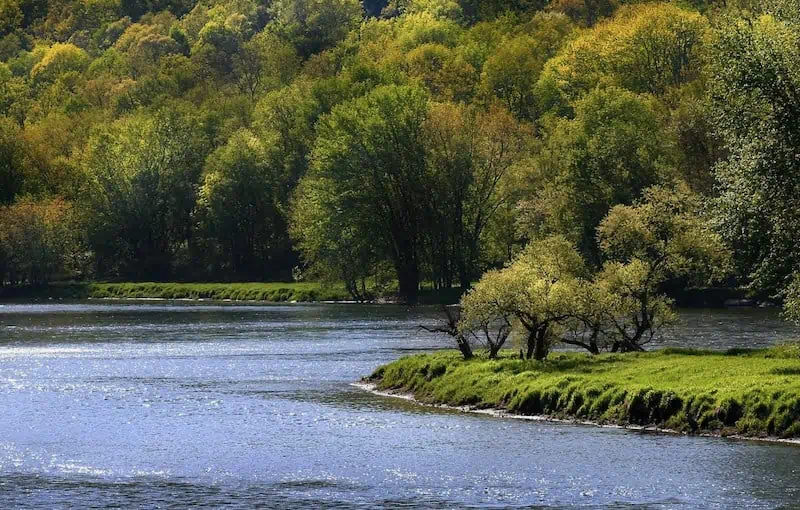
Metal detecting in and near rivers is one of my favorite hobbies. Rivers are constantly moving and constantly changing, so you never know what you will find! Some rivers contain gold, some rivers contain lost jewelry or coins.
This article will give you 50 tips to get started metal detecting in rivers.
1) Plan Well
I am a huge advocate of planning well. If you plan and organize yourself, you will be less likely to forget something. If you will be camping or driving quite far to reach the river you intend to metal detect, it is especially important as you can’t easily get back to pick up a missing item. Planning well will save you time, effort, frustration, and money!
Part of proper planning involves making sure you have the right detector by your side. Below, please use the interactive guide to view five of the more popular metal detectors available on Amazon:
| Photo | Model | Price | Features |
|---|---|---|---|
 | XP Deus Wireless | $$$ | 11” DD Coil |
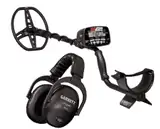 | Garrett AT Max | $$$ | Waterproof to 10 feet |
| Bounty Hunter TK4 Tracker IV | $ | 8” Waterproof Coil |
2) Research Your Area
Research is one of the most valuable tips for any metal detectorist. Here in the western U.S., we have a lot of rivers containing gold. While a lot of pieces are too small for all metal detectors to read, there are still small nuggets and flakes. Maybe your area is within the Civil War range, and you may find relics in the rivers and along the banks. Many southern states have rivers full of Spanish gold and silver coins.
Check your local library and city hall for information about your area.
3) Talk to Historians
While researching your area, you can always find a local historian to find more about your area. Local historians will be well versed in the activities that took place nearby and can tell you more about how your river was/is used. Most civilizations started near the water, so these areas can be rich in history.
4) Choose the Right Metal Detector
Depending on your chosen metal, not all detectors are created equal. All metal detectors will pick up items like coins, jewelry, and relics. But if you are specifically looking in the river for gold, you may want a machine made specifically for gold. There are 2 types of metal detectors: very low frequency (VLF) and pulse induction (PI).
PI detectors can find smaller pieces of gold, while VLF detectors are lighter and typically easier to use. Whichever mode you decide to use, make sure the search coil is submersible.
The following are some of my favorite metal detector manufacturers:
5) Consider a Submersible Metal Detector
If the river you are detecting in is deep or very quick moving, you might want a metal detector that is fully submersible. If you drop your detector in the water and it isn’t fully waterproof, you could be out a detector.
Many fully submersible models are affordable and well worth the price if you’re detecting in water, such as the Fisher F22 or the Garrett Ace 300.
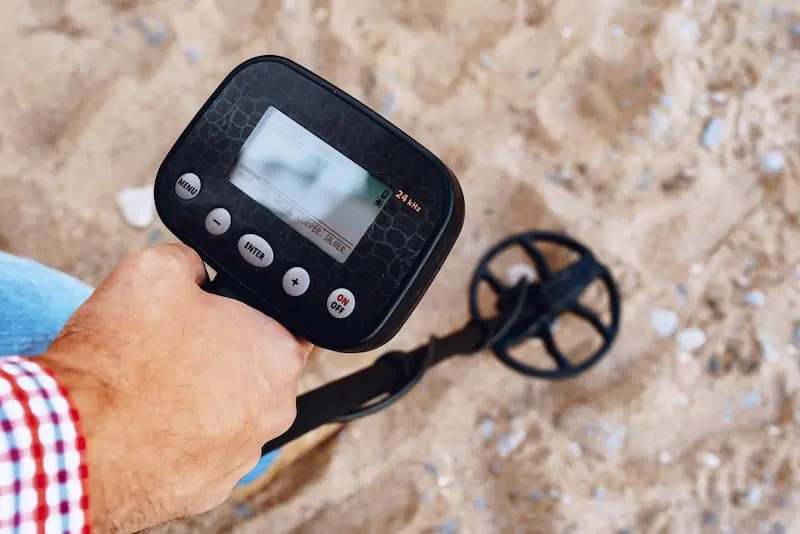
6) Search Coils
A lot of metal detectors have optional search coils. These are interchangeable with one another and are good for different areas. Concentric coils search deeper than wide scan. Wide scan coils have better discrimination.
A large search coil will search deeper, but smaller search coils can fit into smaller spaces and work better in mineralized soils. Research what type of soil you will be detecting in and choose the appropriate search coil.
7) Pinpointers
I always recommend a good handheld pinpoint metal detector. Detecting in a river is no different. The only catch is, make sure you have some way to attach it to your wrist or belt. This way, if you drop it, it won’t float away downriver. A lot of pinpointers are fully waterproof so they can be used in rivers.
Pinpointers make finding your targets easier because they are more sensitive and smaller than a traditional detector. Most manufacturers of metal detectors make good pinpointers.
Different manufacturers make their own pinpointers, so you can consider getting the Garrett Pinpointer or Teknetics Pinpointer.
8) Accessories
For all metal detecting trips, there are accessories outside your metal detectors you will need. You will want good digging tools. You can root around in the soil some with your pinpointer or hand, if the river bottom is soft. The rivers I usually metal detect in are full of rocks, so I like to take along a full-sized metal deteciting shovel and good hand trowel.
A tool belt can be helpful to hold the smaller items and keep them organized. I usually take along a backpack to hold my tools, but it can be inconvenient if you are away from the shoreline and need to dig through it for a trowel. Tool belts are easier to work with. Don’t forget to grab a pouch to carry your finds in. I prefer the type that mount onto your belt so they can be conveniently reached.
- You might also want to read: 10 Metal Detecting Accessories Needed for Treasure Hunting
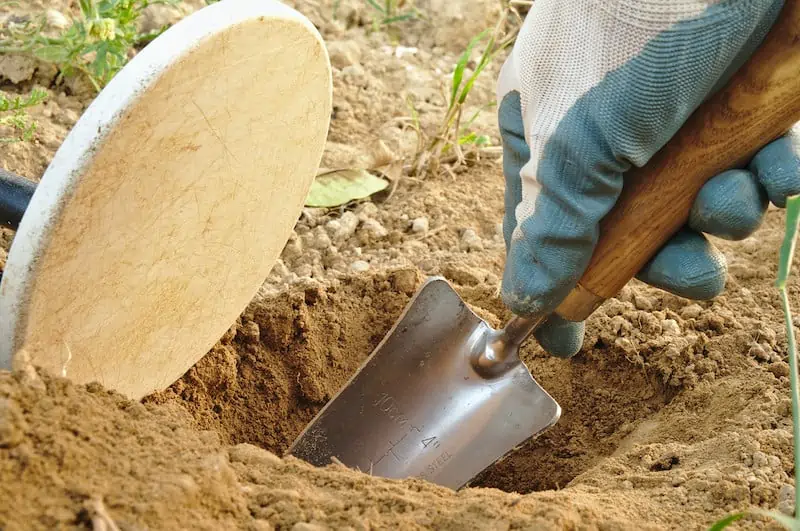
9) Read Your Manuals
Read thoroughly through your metal detectors’ manual to make sure you are familiar with all the settings and features of your machine. I like to keep the manual in my detector bag in case I run into something unfamiliar.
Plus, my manual has a good chart showing what metals ring out under what tone and number. It made learning the sounds and sights of my metal detector easier.
10) Test Your Detector at Home
I always recommend testing your metal detector at home. Take items like a penny, dime, nickel, quarter, gold ring, and iron. Run each item across the coils of the detector and note the tone and readout on your LCD screen (if your model has one).
This is very helpful when learning a new detector. Some signals can be very close to one another, such as iron and gold, so this can help you learn to differentiate the tones.
11) Bring Bug Spray!
Bugs, typically mosquitos, tend to gather near the water. You will want to bring bug spray along. Be sure to spray all exposed skin. This can also help keep ticks off you if you’re crossing through the woods to reach the river.
12) Bring Extra Batteries
Always bring extra batteries with you. It is no fun being in the middle of a river and having your metal detector’s batteries die. Most metal detectors require AA or 9-volt batteries, while others have rechargeable battery packs.
Models with rechargeable battery packs typically have a standard battery backup. Make sure if your metal detector has back up battery power that the batteries are fresh.
13) Bring Extra Water
When metal detecting in cool weather or cool water, you may not feel thirsty. But you are!
Always take extra water with you and make sure you stay hydrated. Make sure you drink more when the weather is hot, or you are perspiring.
14) Wear Good Shoes
Good shoes are always recommended for metal detecting, but metal detecting in a river requires shoes with very good traction. River rocks can be very slippery, even with good shoes. So, make sure to use caution and wear good shoes, such as quality hiking boots.
15) Bring Gloves
While wet gloves can be obnoxious, you may want to bring a pair in case you need to move rocks. Some of the rivers near me have had rocks moved to create different paths or slow the flow of water so people can pan for gold.
I have had to move them on many occasions, and gloves help keep my hands from getting scratched or cut.
16) Bring a Strong Magnet
I like to take a strong magnet to clear away some of the magnetic targets when detecting in the river. I have pulled up many fishhooks, fish weights, and junk with the magnet. This makes the area a little bit easier to scan with the detector.
17) Consider a Life Jacket
If you are not a seasoned swimmer, or the river you are metal detecting in is deep or quick moving, I recommend a life jacket. Getting pulled downriver can be extremely dangerous and keeping yourself afloat takes a lot of energy while battling the river current. Life jackets save lives!
18) Become Familiar with Metal Detecting Laws
One of the most important tips for metal detecting in rivers, and anywhere else, is to know the laws. Certain areas forbid all metal detecting. Each state has laws regarding detecting, but there are also city, federal, and Forest Service laws.
For example, national forests allow detecting, so long as you follow mining laws (if prospecting) and avoid archaeological sites. If you find an archaeological site, it is your responsibility to turn it in. Be sure to do your research before you metal detect in the rivers. If you cannot find your specific river, you can call your local or state officials, or call the forest rangers.
- You might also like: Metal Detecting Laws: Where Can I Detect Treasure?
19) Stay Away from National Parks and More
Most national parks, state lands, and federal lands have their own laws regarding metal detecting. If you come upon any of these lands, make sure you know the laws to cover yourself. You will absolutely get fined for metal detecting in an area where it is prohibited.
Most national parks will have information on their website stating that metal detecting is prohibited. Again, you can call your local or state officials, or contact forest rangers if you are unsure.
20) Watch for Private Property
A lot of rivers run through rural or mountainous lands. Some of these areas can have private property. While private property is supposed to be clearly posted, sometimes the signs, paint, or other visuals are degraded.
Keep an eye out for fenced areas, trees with paint on them, posted signs, and gates. Without the property owner’s permission, you can be fined for trespassing.
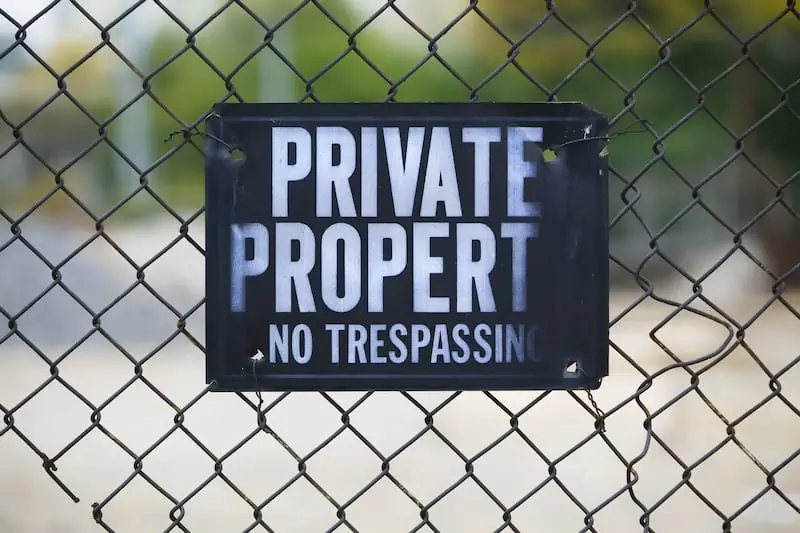
21) Watch for Claims
Rivers where gold is produced often have claims. The area I detect frequently in southwestern Idaho is littered with claims. While you can recreate on someone’s claim, you cannot metal detect, prospect, or remove any ore. As with private property, claimed areas are supposed to be clearly posted. Keep an eye out if you are in a gold producing area.
22) Be Aware of Your Surroundings
When you are metal detecting in the river, make sure you always stay aware of your surroundings. River bottoms can be slippery and there can be holes and other hazards. If you are in a mountainous area, you will also want to keep a lookout for wildlife.
My family and I heard several bears on the opposite side of the river on our last metal detecting trip to northern Utah. Some rivers are home to dangerous animals, like alligators. Always keep your eyes and ears open!
23) Headphones
While headphones can help you hear faint signals, they can also take your focus off your surroundings.
When I am with my family, I will sometimes wear metal detecting headphones if everyone else has theirs turned off. That way I have someone to watch the surroundings for me while I listen to my detector.
You may want waterproof headphones in case they get wet.
24) Bring a Good Friend
As I mentioned above, my family and I often metal detect together. Not only does bringing someone along give you company, but you can search a larger area. It is always a good idea to have another set of eyes and ears when you are metal detecting.
25) Bring Your Cell Phone
There are some hazards associated with metal detecting in the river. In case you slip and are injured or get lost, it is always a good idea to bring along your cell phone. Make sure it is waterproof, or inside a waterproof container.
Also make sure it is secured in your backpack or a zipper pocket on your clothing. I have seen many cell phones pulled out of rivers, and some still work if they are waterproof or in a protecting container!

26) Know the Tides
If you are metal detecting in a river with strong tides, you need to know the timings of the high tides and plan accordingly. Tides tend to come in very quickly, so do not stray too far from the riverbank in these areas if it is near high tide.
27) Look for River Fords
A river ford is a shallow place on the river where people can cross. These are good areas to metal detect as the water is shallow. Watch the water flow and detect the lowest part of the water flow where heavier items would accumulate over time. I
If you see a raised section where water flows up and over, check at the base of the elevated portion to find any embedded materials that could not flow over the raised section. Any trees in the ford should be checked. Also look for old fords, which will be evident where the riverbed is hard-packed from crossings.
28) Look Along Riverbanks
River levels fluctuate throughout the year based on precipitation and snow melt. This can cause the riverbanks to become flooded, thus washing all sorts of goodies onto and into the riverbanks.
29) Check Riverbeds
Because I live in an area known to have gold, I always check the riverbeds with my metal detector. Flooding and heavy rains can wash gold into the riverbeds, where it becomes trapped. Look for areas where the water naturally slows and check them. Also look for large boulders as heavy items tend to get trapped at the base of the boulders.
Many rivers are used recreationally and as such, many people have lost jewelry, electronics, coins, and other valuable items in the rivers. If the river is particularly deep or quick moving, make sure you are experienced and have a waterproof detector.
30) Check River Beaches
When we talk about metal detecting on the beach, we commonly think of the ocean. However, river beaches can be extremely rich in items! Detecting along river beaches negates the issues associated with high soil mineralization and saltwater.
River beaches are also not as crowded as coastal beaches. People tend to recreate near rivers, so these areas are likely to be littered with valuables.
31) Check River Falls
Some rivers contain natural waterfalls. These can be areas where heavier items stay put as they are too heavy to continue to wash downstream. Jewelry and lighter items tend to continue washing downstream after a river fall, but not all items will.
32) Stay in Shallow Water
If the river you are metal detecting in runs deep in the middle, stay around the shallower sides. This is where the best finds tend to gather.
33) Check Any Bends in the River
One of the better places to find items in the river is after a long straight portion. Gradual shallowing of water occurs before the bend typically and items in this area may not have been carried away by quick moving water.
Water typically runs the slowest in floods around bends and heavier items will be deposited in the bends. These shallower areas were often used for river crossings, too. Scan these areas thoroughly.
34) Check Near Bridges
Bridges typically have a lot of human traffic near them, so check under bridges. Also look for old bridges where people would have crossed on foot or horseback. Many coin caches have been found under or near bridges. People often stashed items here and sometimes didn’t come back for them.
35) Check Eroding Banks
These areas are likely to produce more recently fallen items. As the bank erodes it falls into the water. Finds tend to be right near the bank where the current has removed lighter soil particles and left heavier items.
36) Look for Fallen Trees
Fallen trees become major obstacles to water flow, especially during times of flood.
Turbulence is caused by the trees which cuts away the riverbed.
37) Ground Balance Your Metal Detector
Many rivers have quite a bit of pollution. Some of this pollution is from mining or industrial areas. In mining areas, there will likely be a higher level of iron ore in the soil.
Ground balancing your detector will help you pick out good targets. You may also need to adjust your sensitivity if you are getting too many signals or your machine is going haywire.
38) Use Good Sweeping Techniques
It is important to sweep with your metal detector properly. Keep the search coil close to the ground and sweep in a fluid motion from side to side. Remember not to curve up at the end of your swing. Keep the coil level with the ground.
Keeping the search coil too high off the ground can increase noise and interference, causing you to miss targets. Don’t sweep too quickly, either. Sweep slowly from side to side.
39) Using Pinpoint Mode
If your metal detector has pinpoint mode keep it directly above the target signal. Move the detector slowly away from and back toward the target sound. This will help you more accurately find the signal. You can also use your handheld pointer once you’ve found a target signal.
40) Be Courteous
It is important to follow metal detecting etiquette while hunting. If you dig a hole, fill it back in completely. If you dig trash, haul it out. Don’t detect near people recreating. If you find a historical item, notify the proper authorities.
If you find dangerous objects, notify the police. Protect natural resources, wildlife, and property. Be courteous and remember you are representing all metal detectorists while hunting!
41) Don’t Be Afraid to Ask Permission
If the river you chose to hunt in goes through someone’s private property, it doesn’t hurt to ask the landowner if you may metal detect on their property. If they say no, so be it. But often they will say yes.
42) Be Respectful if Detecting on Private Property
If someone has allowed you to metal detect on their property be courteous! Follow the metal detecting etiquette tips and don’t leave holes all over the property.
43) Keep a Logbook
Keep a logbook of the items you find, where and when they were found. This can often lead to developing patterns so you’ll know where the most likely place to find a target will be.
While river hunting, you don’t have to stop and log each item’s location, but after sweeping a section of river, note whereabout you were when you find the items.
44) Join a Metal Detecting Club
Metal detecting clubs are a great resource.
Many detectorists in these clubs are very experienced and can give you some great tips. There are metal detecting clubs in the U.S.
45) Don’t Have Unrealistic Expectations
It is important to remember that you will likely not find a hugely valuable target every single time you detect, regardless of location. If you go out with the mindset that you will only be finding good targets you will be sorely disappointed.
46) You Will Dig More Trash Than Treasure
Be aware that you are much more likely to find trash than treasure. It seems that there are dozens of trash targets for every decent target! But, when we find trash and haul it out, we are leaving the area cleaner than we found it. Which is good for everyone! So, don’t get too discouraged by the trashy targets.
47) Authenticating Finds
If you find an old coin or piece of jewelry in the river, you may wish to find its value. In these cases, you can use online tools, or you can take it to professionals. If you’ve found a Civil War era button, take it to a Civil War expert or museum.
If you’ve found a coin from the 1700s, take it to a coin shop. If you’ve found a piece of antique jewelry, find a jeweler. There are also places that will test the metal if you’re unsure what it is.
48) Be Gentle When Cleaning Finds
It is important to be very gentle when cleaning your finds. Some of these items are quite delicate and will scratch or mar with heavy scrubbing. I like to use a mild dish soap and water along with a very soft toothbrush or other soft brush. If you are in doubt, leave it as is or just rinse it in plain water.
49) Be Safe
Always think about safety when metal detecting in the river. Rivers are ever changing, and some are very quick moving and/or deep. Don’t take unnecessary risks when detecting in rivers and be safe. Don’t go out on the river alone and always tell others where you’ll be and when to expect you back.
50) Have Fun!
My final tip is to have fun! Don’t take metal detecting so seriously that you take the fun out of it. It can be frustrating when you’re digging nothing but soda cans and fishhooks. But it is such a rewarding hobby! Especially when you stick with it and find that one amazing find!
- If you enjoyed this article, please “like” our Facebook page!
You Might Also Want to Read:
